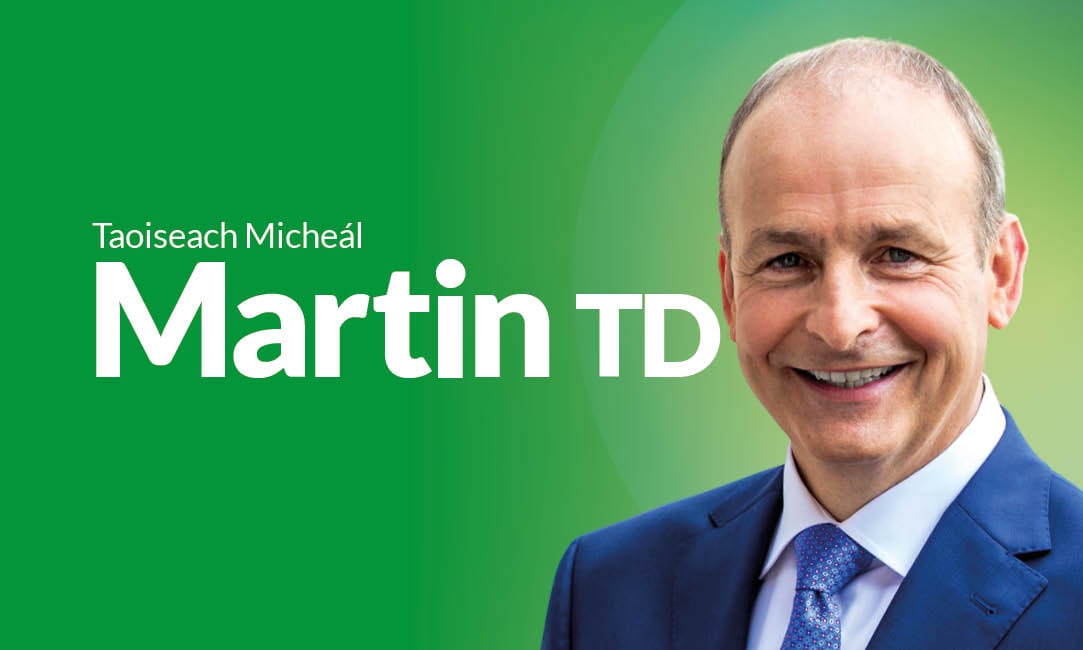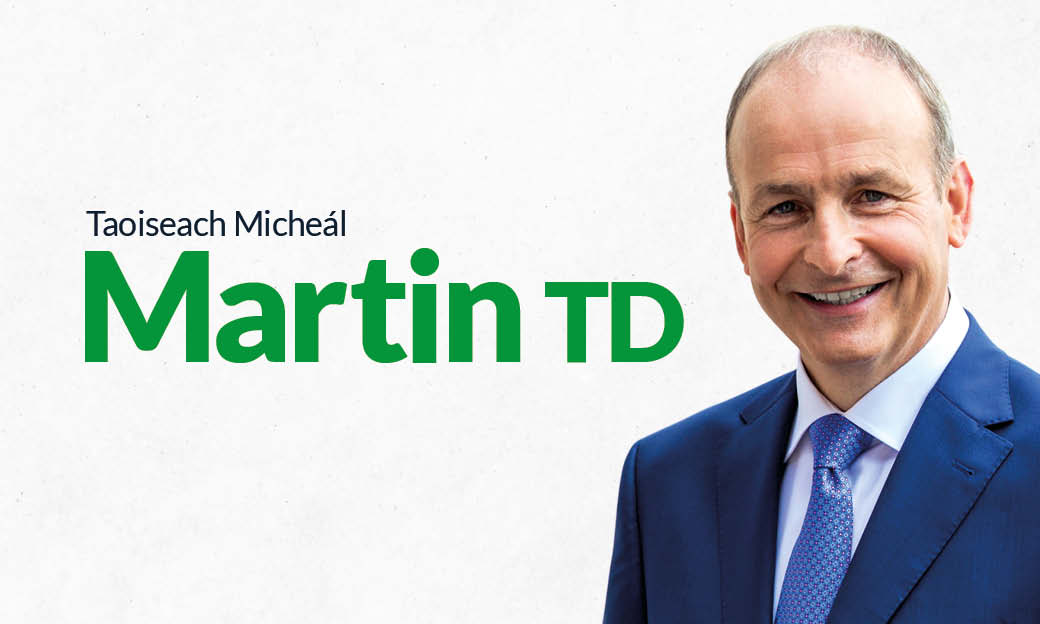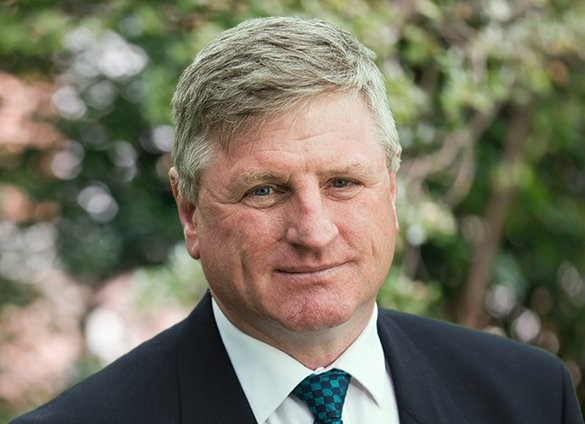An Tánaiste, Micheál Martin - Arbour Hill, Sunday 16th April 2023
Published on: 16 April 2023
An Tánaiste, Micheál Martin
Uachtaráin Fhianna Fáil
Fianna Fáil 1916 Commemoration
Arbour Hill, Sunday 16th April 2023
CHECK AGAINST DELIVERY
A Dhaoine Uaisle go léir,
Luachanna mar mheas a bheith againn ar gach duine agus dínit an duine a chur chun tosaigh i gcónaí. Ba léir go raibh macalla de na luachanna seo ag teacht chun cuimhne go soiléir dúinn, ag dul siar go dtí fís na ndaoine a throid ar son ár saoirse i míle naoi gcéad sé déag.
Táimid bailithe le chéile anseo inniu i gCnoc an Arbhair i gcuimhne ar agus chun ómós a thabhairt do laochra a ghlac páirt chróga i míle naoi gcéad sé déag.
Bhí páirt lárnach acu i mbunú an Stáit nua agus gan amhras tionchar láidir ag idéalachas na laochra seo ar ghlúinte a lean ina ndiaidh, suas go dtí an lá atá inniu ann.
Chuir na laochra seo crógacht, misneach agus tuairimí oscailte fadradharcacha i láthair an phobail chun daoine a thabhairt le chéile ag leanúint fhís Wolfe Tone den Náisiúnachas agus den Phoblachtachas.
Le blianta beaga anuas, táimid ag comóradh imeachtaí tábhachtacha a bhaineann le bunú an Stáit le scoláirí nua ag féachaint ar stair na tíre agus ailt nuascríofa agus díospóireacht ar bhealach neodrach, oscailte, cruinn gan aon chlaonadh, faoi bhunú an Stáit ar fáil anois.
I rith na seachtaine seo chualamar Uachtarán na Stát Aontaithe Joe Biden ag caint go minic faoi luachanna tábhachtacha ar cheart a bheith i sochaí.
In recent years we have been marking some of the most important moments in the history of our country and the creation of one of the world’s oldest parliamentary democracies. It’s been a period of deep public engagement and growing understanding. The most important thing is that we have made sure to reflect on what these events meant for different traditions and to accept that a modern republic must acknowledge all sides of its history.
They did not expect that the new republic would be perfect – that it would avoid mistakes which are found in any work of humans. However they did expect that the new republic would ultimately ensure that the people of Ireland would secure a more prosperous and progressive future. And their republicanism was one which sought to constantly evolve – to seek new ways forward.
Through a full decade of commemoration events there is no doubt that the Rising of 1916, and the loss of the men buried in this hallowed place, retains a unique place in our hearts.
The generous and open commemoration of the Rising, its continued relevance to our sense of who we are and who we want to be, has been inspiring. At a time when dark forces of nationalism are resurgent in many places in the world, we should be very proud of this.
The true spirit of 1916 is the spirit of modern Ireland – a positive vision of an outward-looking and inclusive Ireland.
An Ireland which is always seeking to find new ways forward.
An Ireland which confidently takes its place in the world, committed to the values of a free, democratic republic.
When our party’s great founding generation first came to this place, they did so in remembrance of men who they had known as friends and comrades. Led by the most senior surviving officer of the Rising and many others who had participated throughout Easter Week and the years to follow, this was no easy occasion for them.
Still ringing in their ears was the soaring oratory of Pearse and Connolly. The vibrant humour of MacDonagh and Ceannt. The focused determination of Clarke and the others who lie here.
For them the Proclamation was no cold or historical abstraction. It was an a summary of their creed and a reminder of how it had inspired so many great deeds in the years which followed.
The men and women of 1916 offered a vision for Ireland’s future which was open and modern. They drew inspiration from our country’s past, but they did not want to return to that past.
For them Irish culture was always evolving. They saw it as unique, but they did not want it to be elite or exclusive.
Their belief in education is found throughout their personal activities as well as their written works.
For them education was about helping each individual and society as a whole to grow – to release new energy and new ideas.
It is true that they often wrote in a manner which seems very outdated to us – but there is a core humanism underpinning it which we should never forget.
They wanted an Ireland which included different traditions, welcomed women into the political life of the nation and which sought friendly cooperation with other nations.
In this this were almost unique in contrast to the nationalism seem through much of Europe at that time. Elsewhere the nation was often defined as involving one cultural tradition and movements sought to achieve dominance for their own tradition.
Nowhere else did the founding document of a national movement demand that a new republic guarantee “religious and civil liberty, equal rights, and equal opportunities to all its citizens”.
In this they have been proven right time and time again.
Instead of taking a path of growing together we drifted apart and these divisions were constantly exploited by those who sought victory rather than reconciliation.
There is no greater disrespect you can pay to the men and women of 1916 than to claim that they changed so little that the same agenda and same methods continued to be needed.
The people who refuse to recognise how many new opportunities 1916 opened up for our country are the same people who always ignored the demand of the Proclamation that all who sought to serve the Republic should do so without “cowardice, inhumanity or rapine”.
Chuir fir agus mná a raibh baint acu le míle naoi gcéad sé déag, fís d'Éireann oscailte, nua-aimseartha os comhair an phobail.
Fuair siad inspioráid ón am a bhí caite agus bhí tionchar ag stair na tíre orthu, ach ba léir nár theastaigh uathu filleadh ar an am a bhí thart.
Dóibh siúd, bhí an cultúr Éireannach ag síorathrú, cultúr ar leith dar leo, ach ní raibh sí mar aidhm acu go mbeadh an cultúr sin éilít intleachtúil.
Bhí an luach agus an meas a bhí acu ar an oideachas le feiceáil go soiléir ina n-imeachtaí pearsanta chomh maith lena saothair scríofa.
Don ghlúin chróga sin, bhí oideachas ann chun cabhrú le gach duine aonair agus leis an tsochaí Éireannach fás agus forbairt-chun fuinneamh úrnua agus tuairimí nua a scaoileadh i measc an daonra.
Is fíor gur scríobh siad go minic i slí a cheapaimid anois a bhí seanfhaiseanta dúinn ach tá daonnacht mhacánta dhoimhin ag baint leis an scríbhneoireacht sin nár chóir dúinn ligean i ndearmad go deo.
The Good Friday Agreement was a triumph for the sort of constitutional dialogue between traditions which the Proclamation aspired to.
After 25 years it remains an inspiring achievement and the principles which it sought to embody are as important as ever.
The true heroes of the peace it enabled are those who always believed in peace, who always sought to find a path to reconciliation.
This was something which had been talked about for decades, but the search for reconciliation had constantly been blocked by the small minority who were committed to sectarianism and conflict.
Not just during the years of violence, but in the decades before, wasted enormous opportunities were wasted to work to overcome the divisions between all of us who share this island.
The personal bravery of John Hume and his colleagues throughout the years of violence, where they were attacked by both extremes, should be one of the defining stories of modern Ireland. The absolutely tireless commitment to creating what Seamus Mallon called a ‘new dispensation’ is something which we have a duty to remember and to honour.
Over the years and especially in recent months I have spent many hours meeting with the families of victims. They and others are right when they point out that the 1998 negotiations were silent when it came to the interests of families whose loved ones had been so cruelly taken from them and who were often denied even basic information as to what had happened.
The peace process had many people who contributed to it and we respect their roles. As a party we have a right to particularly honour the irreplaceable role which our leaders played in the earliest discussions, the breakthrough of the Downing Street Declaration, the historic achievement of the Agreement and enduring work of achieving breakthroughs in areas like cross-community policing.
Our commitment to building lasting peace, reconciliation and prosperity on our island is as strong today as it has ever been – and part of this is a willingness to acknowledge when clear problems must be addressed.
After 25 years, to have the main democratic institutions subject to a near-constant cycle of collapse – driven by the ability of dominant parties to ignore the will of the public – is not sustainable. It directly feeds sectarianism and it blocks the ability of the Agreement to deliver on the economic and social progress which Northern Ireland so badly needs.
This is not new. Over the past 25 years different parties have used their ability to block the institutions on a wide range of issues - and have done so because they want to prevent the voice of the majority prevailing on issues even when they do not affect their fundamental rights.
Those who have collapsed the democratic institutions in the past have no standing today to complain about others.
What we need is to break the cycle – to build a politics defined by a positive agenda shared by all communities.
As we heard this week from President Biden, the potential economic and social benefits of effective and stable democratic institutions is enormous.
Sustained investment needs stability. It needs reliable institutions. It needs a shared commitment to helping communities long neglected and exploited.
The will of the people as expressed in the latest election must be respected. And once the democratic institutions are restored we should address the obvious need to reform the operation of the Agreement.
25 years ago the Agreement was a highly innovative effort to bridge major gaps during negotiations. It had never been done before so there was no blueprint to follow.
After nearly a quarter of a century it is natural that there are areas which need to be reformed.
To be clear, the core principles of the Agreement are untouchable. The principle of consent, recognition of different strands of relationships, respect for different traditions, protections for community identities – these and other principles must never change.
But we have to find ways to make the institutions work better. To break the cycle of collapse and restoration – and to start realising the unfulfilled potential of the different strands.
Central to the workings of democracy is that parliaments get convened and are allowed to work after elections. The continued blocking of the basic working of the Assembly benefits no one and is causing immense damage.
We have so much more that we can do in terms of sharing key social and economic tasks. In health, education and community development, the scale of the problems which many communities continue to face can best be tackled by working together.
Sovereign and independent countries in other places have succeeded with highly ambitious programmes of cooperation across borders. Look at the workings of the Nordic Council for example – where different legal and taxation regimes have not prevented hugely successful cooperation between different countries.
The guarantees of the Agreement mean that constitutional protections will fully remain, but reform of the day to day operations of the Agreement is something we need to discuss.
We also need to deal properly and even-handedly with legacy issues.
The attempt to impose unilateral legislation without broad consent is simply wrong.
This has been made worse by the habit of some political groups to only care about the wrongs committed by others.
In recent days we have heard eloquently from President Biden about how the United States remains resolutely committed to helping the cause of peace, prosperity and reconciliation on our island.
Reconciliation and closure will never be achieved until we have an approach to the past which is based on openness and honesty from all.
It is also vital that efforts to address certain legacy issues must be allowed conclude. The Kenova and Denton processes, and in particular the leadership of Jon Boutcher, into specific cases is earning the trust of the families involved – and it is showing how the past can be dealt with better by taking it away from partisan interests.
The brighter future which 1998 opened up for us demands that we work to overcome sectarianism and that we invest in getting to know each other better.
Research published in recent months has shown that regular connections across the Border are nowhere near where they should be. They have also shown how in this jurisdiction many people have strong views about the North but do not challenge themselves to engage more with it – or with traditions they do not belong to.
This is why it is so important that we move ahead with the programme of dialogue, research and investment which we have put in place through the Shared Island Initiative.
For the first time in our modern history there is in place a programme to support deeper connection, improved understanding and shared work to address social and economic needs.
The scale of involvement in the open dialogues has shown the huge appetite for a new approach. People want to stop talking about problems and work together to deal with them.
25 years after the Agreement it remains as a monument to a vision of peace between all who share this island. It has inspired many throughout the world and it will continue to do so.
The central role which the United States played in 1998 was not a once-off, and the President has once again given great heart to those who want to move forward.
ENDS
It is also important to acknowledge the very real improvement in relations with the government of the United Kingdom, from my phone call with him in the days after his appointment up to today, Prime Minister Sunak has kept his work to work constructively and intensively to overcome problems.
The Windsor Framework agreement also showed once again how our allies and friends in the European Union remain fully committed to playing a central, positive role in relation to Northern Ireland.
The flexibility and deep engagement we have seen from every part of the Union, and especially from its senior leadership, reflects again the solidarity with the people of this island which helped so much in the years before and after the Good Friday Agreement.
The foundations are in place for moving forward, but we must start by accepting that too little has been done to realise the full potential of the Agreement – with the constant instability in the institutions being central to this.
The spirit of bravery and openness which led to the Agreement becoming the first ever political agreement ratified throughout our island is something we need to renew.
We need to show new generations how much more we can achieve when we challenge sectarian divisions.
In Easter 1916, the heroes buried in this place set a vision for Ireland. For them the objective was a broad defined by their commitment not just to the freedom of their country, but also its welfare and the interests of all parts of our island.
This inspiring vision is as important today as it has ever been.
Tags:
Micheál Martin


